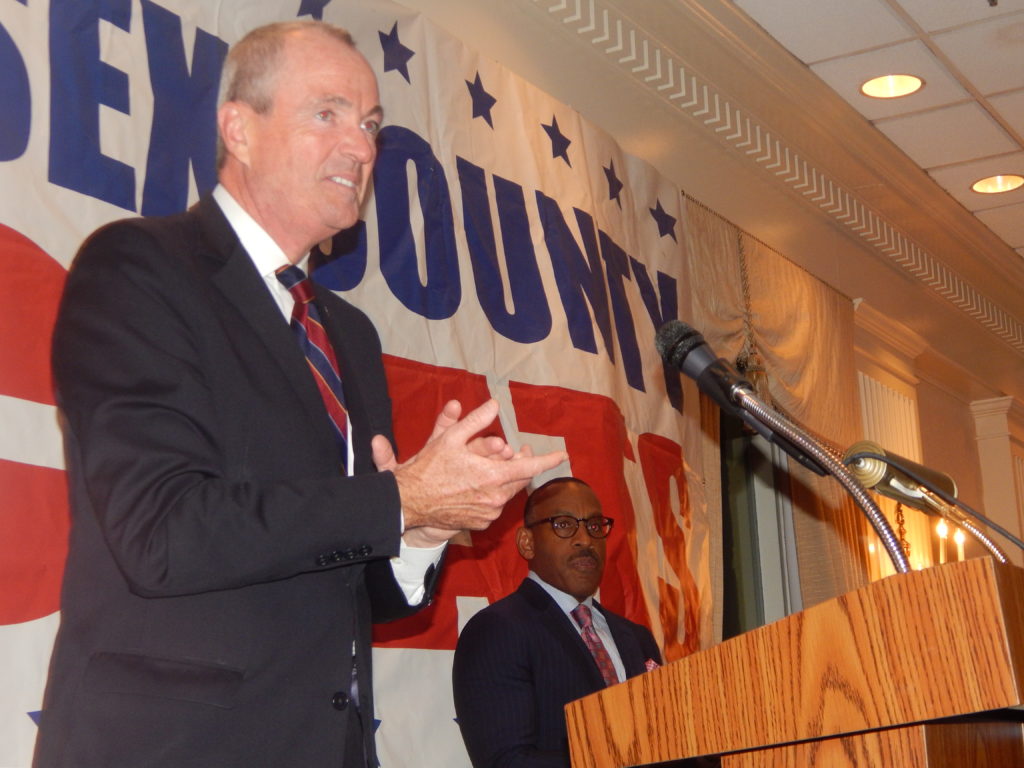Phil Murphy and the National Democratic Party Civil War

In the wake of his victory last week, New Jersey Governor-elect Phil Murphy’s immediate focus is on his transition, both in terms of new appointments and new policies. National Democratic Party issues will have to wait until Murphy is firmly entrenched in Trenton.
Like all other Democratic governors, however, Phil Murphy will have to deal with the reality of the Democratic Party civil war between the Bernie Sanders movement and the center-left Democratic establishment. This internecine conflict is no less intense than the Republican civil war of which I wrote in my last column, between the Trumpist Alt-Right and the GOP center-right establishment.
The insurgents in these civil wars, namely the Trump and Sanders movements ironically share a common three-fold perspective on 21st century America: 1) the “paranoid” style, as labeled by the late consensus historian Richard Hofstadter, in which virtually all the ills of American society can be attributed to conspiracies; 2) the conspirators, who are advocates of globalism, have rigged the system against the deserving working middle class; and 3) there are scapegoats who either do the rigging or benefit from it.
Yet the Trumpist and Sanders acolytes have profoundly different scapegoats, and the difference in these scapegoats account for the differing response of each movement to the current American dilemma.
The Trumpist scapegoats are immigrants and liberal academics. Accordingly, the Trumpian response is a white cultural war against multiculturalism.
The Sanders scapegoats are financial oligarchs, and therefore, the policy response of the Sanders movement is a populist class war to impose socialism and cradle-to-grave, government guaranteed economic security. In advocating a massive redistribution of wealth, Sanders is also in tune with the former Louisiana Governor and U.S. Senator Huey Long and his message of “Every man a king.”
In the foreign policy arena, the Trump slogan is “America First,”, while the Sanders movement espouses a mantra of Blame America First. The Sanders hostility extends to America’s leading Middle Eastern ally of shared values, Israel.
Yet the Democrats have something the national GOP lacks: a person who can arbitrate and mediate between the two warring factions. That person is our 44th president, Barack Obama, whose power and influence within the Democratic Party is arguably even greater than when he held office.
I continue to have profound disagreement with Barack Obama over a host of foreign and domestic policy issues. Yet my respect for his political sagacity has grown significantly over the past decade.
It must be noted that Obama’s perspective on American politics is vastly different from that of Bernie Sanders. To put it in perspective, Barack Obama is a disciple of the late Saul Alinsky. The politics of Sal Alinsky is light years apart from that of Bernie Sanders.
Unlike Bernie Sanders, Saul Alinsky never embraced the idea that the system is rigged, never communicated in the paranoid style, and never employed scapegoats. Neither did Saul Alinsky embrace socialism – or any other economic theory for that matter. His overriding principle was community organization. His message was that the system, far from being rigged, could be captured and made to work for the grassroots, if the community masses were organized properly.
So while the message of Bernie Sanders is one of pessimism and class warfare, democratic Marxian-style, the Obama message has always been a positive one of hope and change, in the simple, non-angry populist language of “Yes, we can.”
In spite of this profound difference of tone and substance, Sanders followers revere Obama and will accept his intervention and arbitration. So will the Center-Left Democrats.
Yet any Obama intervention will come with a price: He will want the party to accept and ratify his preferred candidate for the 2020 Democratic presidential nomination, former Massachusetts Governor Deval Patrick.
How does all this affect Governor-elect Phil Murphy?
The tone of Phil Murphy’s campaign was decidedly not Bernie Sanderesque, but was right out of the Obama playbook of hope and change. In terms of program and policy, however, the Murphy campaign was pure Bernie Sanders: free college, free medical care, more money for government employees, no limit on taxation.
Reality will set in on Phil Murphy, however. He will be successful in enacting the millionaire’s tax, but no new taxes beyond that. New Jersey Democrats have learned the lesson of Jim Florio in 1990 when it comes to tax hikes. There will not be nearly enough revenues to enact anything beyond a small portion of Phil Murphy’s Sanderesque agenda.
It will be to Phil Murphy’s advantage, however, if Barack Obama intervenes to resolve the Democratic civil war. The new governor wants to keep New Jersey Democrats united and shielded from fratricidal strife.
So I have no doubt that Phil Murphy will welcome a Barack Obama intervention. Obama’s agenda of securing the Democratic nomination for Deval Patrick will be a major setback for the presidential aspirations of Murphy’s friend, New Jersey U.S. Senator Cory Booker. For New Jersey’s new governor, however, this will be a small price to pay.
Alan J. Steinberg served as Regional Administrator of Region 2 EPA during the administration of former President George W. Bush and as Executive Director of the New Jersey Meadowlands Commission under former New Jersey Governor Christie Whitman.








Maybe Mr. Steinberg can spend his time trying to fix his own party rather than putting out fevered spin?
He encouraged Kim Guadagno to go full Trump and predicted that she would win. Obviously, didn’t work for her nor for Gillespie.
Democrats ae a mess all over the country. The few left in New Jersey better enjoy it for the short time that democrats have left.